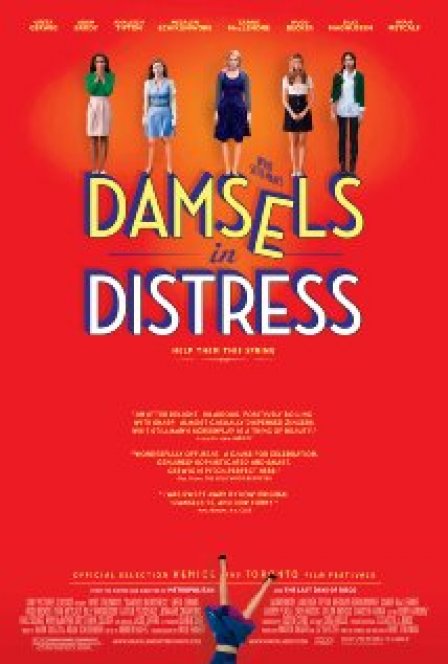One of the best and worst attributes of college is the opportunity it presents for youth to get promiscuous ideologically. Figures from Ayn Rand to Peter Tosh to Zoroaster briefly acquire more relevance than they deserve before limping back into the intellectual and spiritual hinterland. Whit Stillman has been mining these academic impulses for humor since 1990’s Metropolitan, in which two college-aged characters find themselves in an argument about the relative merits of Fourierism before the film even hits the 10-minute mark. Damsels in Distress, Stillman’s newest film (and first in nearly 15 years), finds itself in the same territory, deflating and subverting the philosophical vagaries of the young and overconfident.
The film follows four undergraduate girls at the fictional Seven Oaks College. Each sharing their name with a flower (Violet, Heather, Rose, Lily), the girls act as a small but vocal public charity on campus, with the group’s de facto leader Violet (Greta Gerwig) declaring and guiding their mission to rescue and reform the more wanton of their peers. As is Stillman’s trademark, the group’s philosophy seems almost whimsically conservative: they offer tap-dance classes as suicide prevention, mistrust the school paper’s socialist leanings, and insist that the campus’ elite Roman houses be kept open (lest their occupants, the standard overprivileged man-children of campus films eternal, wander into danger). Violet’s dream is to bring joy and health to people the world over by inventing a new dance craze. She also believes it’s inherently more gratifying and more reasonable to simply date ugly men. There’s a smallness to the characters’ universes that seems perfectly drawn, a wholesomeness to their enterprises that’s inescapably young — the worlds of darker experience they haven’t yet seen barely enter into the film. These girls are literally traumatized by bad smells and find redemption in the balanced odor of quality soap.
Damsels is, in many ways, a continuation of the sort of dialogic essay Stillman has always made: his films are more text than story, with characters often treated as stand-ins for a vein of argument or as vehicles for absurdity (one boy in the film, having skipped kindergarten, does not know the names for colors). Violet’s great trauma in the film is having grown up with a marginally embarrassing birth name, Emily Tweeter; that she’s also an orphan is delivered as an aside. Stillman’s cast does a fantastic job of deadpanning their witticisms, with Gerwig and Zach Woods (as the school paper’s smarmy editor) standing in perfectly for Stillman’s standbys, Chloë Sevigny and Chris Eigeman. Sardonic and hilarious, the script hops from defenses of elitism to the decline of homosexuality to the revival of the Cathar sect of Christianity (and the attendant sexual proclivities of each). The film plays at the top of its intelligence, rarely pausing long enough to let the audience reckon with whether or not they’re being condescended to, winked at, lauded, or mocked.
This is what seems to undo Stillman in many viewers’ eyes. His films beg you to look around the theater, making sure everyone else is in on the joke. There’s nothing fresh in pointing out Stillman’s fixation on privilege and its soignée discontents, but one can’t help but notice that this director deals primarily with the non-problems of the finishing school set and always seems to come down on their side in debates. In an era when people are willing to affix a tag of “white people problems” to every act unwilling or unable to mask its privilege, Stillman remains defiantly forthright about his origins and his concerns. Whether this makes him brave, an ass, or both is a decision best left to the individual ticketholder. Damsels, thankfully, spares us somewhat from that argument by being so funny that it’s impossible to take any side seriously — all that’s left to smirk at is the folly of youth.

